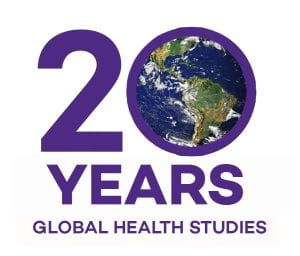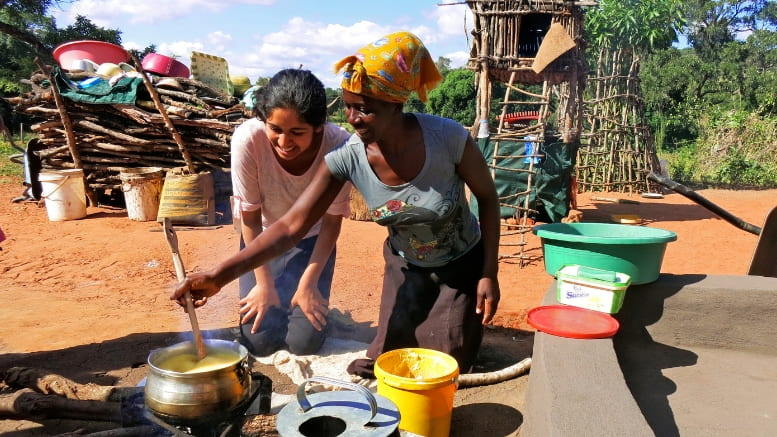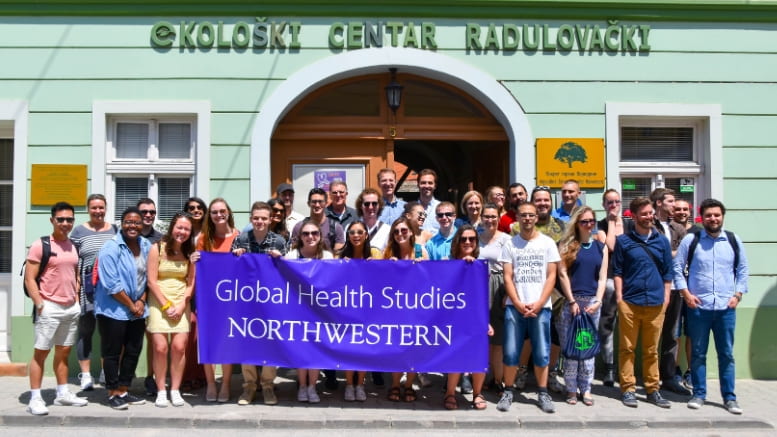Since its 2004 launch, the innovative Program in Global Health Studies has addressed students’ rising interest in creating meaningful change in the world with a diverse array of courses, faculty, and experiences.
Right away, William Leonard knew Northwestern University was onto something.
At the turn of the century, Northwestern’s Office of International Program Development (IPD), led by Dévora Grynspan, secured an institutional grant from the National Security Education Program (NSEP) to establish interdisciplinary training in international health. Spurred by that funding, Leonard, a professor in the Department of Anthropology, teamed with Claudia Morrissey from the Department of Preventive Medicine at Northwestern’s Feinberg School of Medicine, to teach a new course titled Introduction to International Public Health in the fall 2001 quarter.
Leonard and Morrissey figured maybe 20 students would enroll in the first-of-its-kind course.
“Maybe we’d hit 25,” Leonard allows.

Within the first half hour of pre-registration, however, all 25 slots were filled. Although Leonard and Morrissey quickly increased the cap to 50 seats, the course hit that mark before pre-registration closed.
Looking back, Leonard says he should have recognized the student’s excitement. There was, after all, swelling interest among Northwestern students in doing meaningful work, particularly on the global stage. At the same time, the U.S. government had launched massive global health programs to combat diseases like HIV/AIDS and malaria, drawing considerable public attention to international health disparities.
“We had students across different disciplines wanting to bring about positive change to health issues like infectious disease, child malnutrition, and disparities in health outcomes that shouldn’t exist on this planet,” Leonard says. “It showed in the enthusiasm for our course and the courses that immediately followed ours.”
Three years later, Northwestern would launch its Global Health Studies (GHS) program to meet ever-rising student demand and inspire a generation of eager changemakers to address health disparities around the world.
Celebrating its 20th Anniversary in 2024, the Weinberg College of Arts and Sciences-housed GHS program is now regarded as one of the premier academic programs of its kind in higher education – a robust effort with unrelenting student interest, a lively assortment of courses, a diverse roster of accomplished faculty, and innovative initiatives powering its spirited evolution.
Immediate momentum
Powered by the NSEP grant, Northwestern’s early international health courses not only regularly reached capacity, but also sparked a number of students to create ad hoc majors in global health. Students’ undeniable interest in the burgeoning field encouraged Leonard and Grynspan to craft and submit a formal proposal for an undergraduate GHS curriculum.
In 2004, Weinberg College leadership approved the creation of a seven-course minor in global health – the University’s first undergraduate program to require a study abroad experience – and appointed Leonard the program’s founding director. Grynspan’s IPD office, meanwhile, formed institutional partnerships with universities in France, China, Mexico, and South Africa to help craft study abroad programs for GHS students.
Together with IPD’s new international partnerships, the GHS program’s stern commitment to help students learn about improving wellbeing at home and abroad generated immediate excitement across the Northwestern ecosystem. Within a few years, GHS began incorporating new faculty, including its first full-time faculty member, Elizabeth Barden, in 2009, as well as new courses covering different topical areas, such as global bioethics, mental health, and emerging global health challenges.
“Our students were actually our best advocates,” says GHS assistant director Greg Buchanan, who joined the GHS program in 2006. “We even had some students who would approach [then-Weinberg College Dean] Dan Linzer at events and meetings and petition for more global health courses.”
A 2008 grant from the National Institutes of Health (NIH) propelled the upstart program’s development and ascent. In particular, the NIH grant solidified connections between Northwestern’s Evanston campus and the Feinberg School of Medicine in downtown Chicago, helping to make global health a University-wide strength.
“All of these things were really coming together and building off the initial NSEP grant to create a dynamic program with strong momentum,” Buchanan says.
The program was also gaining recognition beyond Northwestern. In 2013, NAFSA, the world’s largest nonprofit association dedicated to international education and exchange, bestowed the Senator Paul Simon Spotlight Award upon the GHS program in recognition of its innovative international work.
Support ignites growth
As the GHS program rolled into its second decade, maintaining its breakneck pace and accommodating student demand remained a significant challenge. Often, Leonard says, he scrambled to find enough faculty to regularly teach the program’s core courses, which consistently reached capacity before the beginning of general registration.
With support from Weinberg College and the Provost’s Office, GHS began expanding its faculty ranks. Full-time, teaching track faculty such as Noelle Sullivan, Peter Locke, Sarah Rodriguez, and Béatriz Reyes joined the program to deliver stability and further fuel the program’s progression.
In 2017, the program unveiled the Global Health Studies adjunct major, an interdisciplinary, 11-course curriculum emphasizing bioethics, research methods, health disparities, and engaged collaborative research and learning. That same year, GHS also initiated a dual-degree program in collaboration with Feinberg’s Program in Public Health. The accelerated program allowed Northwestern students to earn their undergraduate degree and a master’s degree in public health (MPH) in five years.
Beyond internal support from University leadership, external donor support has bolstered the program’s development and expansion, particularly over the last decade.
Donor support inspired enterprising faculty-led undergraduate programs abroad, such as Rodriguez’s program in London on maternal health research and Locke’s program in the former Yugoslavia on mental health in post-conflict regions. The generosity of donors also minimized financial obstacles for students to study abroad and pursue international research projects.
“Donors allowed us to remove a lot of barriers so that we could support students both in terms of additional teaching resources as well as additional financial resources,” says Sullivan, the GHS Program’s associate director.
More recently, funds established by the Watkins family and the Radulovacki family have created an endowed professorship – Leonard holds the Watkins Family Professor of Global Health title – and a Visiting Scholar Program, respectively. The Radulovacki Visiting Scholar holds a one-quarter appointment and offers an undergraduate course in their area of expertise as well as a public lecture. The first Radulovacki Visiting Scholar, Ivan Djordjevic of the Institute of Ethnography in Belgrade, for instance, taught a course in health care under socialism and post-socialism.
 Lively and different
Lively and different
The GHS program’s momentum has remained strong since its 2004 founding.
GHS classes continue to reach capacity, attracting students from colleges and schools across Northwestern and from a range of diverse backgrounds, including international students, first-generation newcomers, and students from different socioeconomic, ethnic, and racial backgrounds.
“It’s exciting and inspiring to see these students from different backgrounds coming together in the spirit of collaboration to address and learn more about global health issues,” Leonard says, adding that the classroom diversity coupled with the fact that many students voluntarily study abroad (international experience is no longer a GHS program requirement) brings dynamic perspectives to the classroom and student work.
Over the last decade, the number of declared GHS minors and majors has nearly doubled from 270 to more than 450, with twice as many majors as minors. The program has graduated more than 1,200 students to date, 29 of whom have earned Fulbright Awards and 10 who have earned Princeton in Africa or Latin America Fellowships among other notable honors.
Deeply rooted in the arts and sciences, Leonard says Northwestern’s GHS program provides students with a critical and broad evaluation of global health initiatives and development, which includes particular program strengths in bioethics, methodological training, and a critical evaluation of social determinants of health.
“We bring a rich sort of social sciences perspective to global health in ways that often are not seen in medical schools or schools of public health,” Leonard says.
Sullivan agrees, saying Northwestern’s GHS program affords students an understanding of the larger social, historic, and cultural context of medicine and public health. It then pushes students’ critical thinking skills and challenges them to examine complex world problems and potential solutions through a social science lens.
“It’s really about asking good questions, not about how do we fix a particular problem, but why the problem exists, what are the historical aspects that brought us to this place, and how might we change the way we’re thinking about these problems,” she says. “If you want to make change in the world, you first have to understand why things are the way they are and why they persist the way they do.”
A promising future
Marching into its 20th year, the GHS program remains a vibrant, evolving force.
The program currently features seven full-time teaching faculty – Elham Hoominfar, Charlayne Mitchell, and Sokhieng Au joining Sullivan, Locke, Rodriguez, and Reyes – as well as three additional tenure-line faculty holding joint appointments in Anthropology and GHS in Leonard, Rebecca Seligman, and Sera Young.
The growing faculty roster alongside a rotating array of external faculty provide the program diverse perspectives enriching the student experience and also extend course topics into compelling areas like water security, nutrition, global epidemics, environmental justice, and Native American health.
“We’ve been incredibly lucky to have people coming in who bring in diversity of perspectives,” Sullivan says. “It’s enhanced how we’re designing our curriculum, how we’re meeting our students’ needs, and how we’re thinking about equity in a really sophisticated manner.”
To further enliven the student experience, GHS sponsors alumni panels and workshops as well as a formal mentoring program pairing current students with alumni in their areas of interest. Alumni mentors, who represent professional fields like international development, reproductive health, rehabilitation medicine, and health communications, provide thoughtful advice to students and highlight relevant training and professional opportunities.
The program’s evolution is ongoing
Next fall, GHS will launch a five-course PhD certificate in global health to provide global health training to PhD students from the social sciences, humanities, and biomedical sciences. The PhD certificate will also help create a pool of talented teaching assistants for the program, thereby allowing GHS to satisfy persistent student demand for its courses.
An upcoming move to the Jacobs Center, meanwhile, will afford the GHS program additional space to grow. It will also place the program in close proximity to other globally minded Northwestern programs, which GHS leadership believes will intensify existing collaborations with like-minded campus allies pursuing international work, such as the Roberta Buffett Institute for Global Affairs, the Program in Environmental Policy and Culture, and the Gender and Sexuality Studies Program.
“There’s a lot of interest in continuing to build these intersections and figuring out how to collaborate together to bring in different perspectives,” Sullivan says.
Reflecting on the GHS program’s 20-year run, Leonard, who remains the program’s director, can only smile. Watching GHS grow from the seedling of an idea into a thriving academic program at Northwestern inspires a mix of joy and motivation.
“We’ve built something truly special here and we’re excited to continue building it,” Leonard says. “It’s inspiring to work with and help train the next generation of leaders in this field, individuals who are committed to addressing global health disparities and improving the quality of people’s lives around the world.”
Timeline: Program in Global Health Studies
For the most optimal experience, view the fullscreen timeline here.

